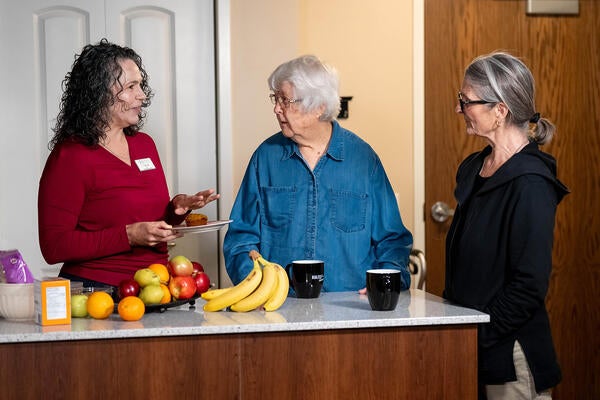
Soaring to new heights
Laura Lester combines her passions for aeronautics and health sciences through her Master’s of Science in Kinesiology and Health Sciences

Laura Lester combines her passions for aeronautics and health sciences through her Master’s of Science in Kinesiology and Health Sciences
By Jenna Braun Faculty of Health During a training course in pilot aeromedicine with the Royal Canadian Air Force (RCAF) in 2013, Laura Lester met a bioscience officer, a Canadian Armed Forces (CAF) member whose primary objective is to optimize human performance in military operational environments.
During a training course in pilot aeromedicine with the Royal Canadian Air Force (RCAF) in 2013, Laura Lester met a bioscience officer, a Canadian Armed Forces (CAF) member whose primary objective is to optimize human performance in military operational environments.
“There are only 46 bioscience officers in the country,” Lester says. “I immediately saw how ideally suited I was for that role. It combines both of my passions — health science and aviation."
Lester became an RCAF bioscience officer and decided that she would like to take the role a step further and be recognized as a human factors specialist. To receive this designation, she needed to complete Waterloo’s Master’s of Science in Kinesiology and Health Sciences program.
“I tried to seek out courses and opportunities that would not only enable me to return to the RCAF a more effective bioscience officer, but also allow me to pursue my passions,” she says. “Having now finished my master’s, I can honestly say that I was able to accomplish both.”
Lester will cross the stage at convocation this fall, along with 300 other Faculty of Health students.
In her first term of grad school, Lester learned to administer and score a movement competency screen — a screening tool that helps to better understand the biomechanics of the body during various movement tasks. She continued to exercise this new skill by volunteering in her winter term to train others to administer that same screen for paramedicine candidates.
“I was also able to apply my knowledge of the underlying principles associated with movement competency to my volunteer work with the Brain and Body program at the Centre for Community, Clinical and Applied Research Excellence (CCCARE) in my spring semester,” Lester explains. “I assessed my participants’ movement patterns and was able to provide appropriate modifications.”
Lester describes her experience with CCCARE as a big highlight of her experience at Waterloo. Through Brain and Body, trained volunteers like Lester are paired with a participant who has anything from a mild cognitive impairment to dementia. Together they create and implement an individualized exercise program.
“I have a long family history with dementia, so this program really resonated with me,” she says. “The participant I was paired with was a great fit, making it a really enjoyable experience.”
Lester also completed two independent studies during her grad studies — one under the supervision of Dr. Ewa Niechwiej-Szwedo in support of her Developmental Visuomotor Neuroscience Lab (DVNL) and the other under the supervision of Dr. Steven Fischer.
 She later seized an opportunity to work in both labs. She supported DVNL by exploring the utility of eye movement tracking to assess pilot situation awareness. She also developed a study and collected pilot data from three separate sessions in the Waterloo Institute for Sustainable Aeronautics (WISA)’s flight simulation lab.
She later seized an opportunity to work in both labs. She supported DVNL by exploring the utility of eye movement tracking to assess pilot situation awareness. She also developed a study and collected pilot data from three separate sessions in the Waterloo Institute for Sustainable Aeronautics (WISA)’s flight simulation lab.
Lester supported Fischer’s Occupational Biomechanics and Ergonomics Lab (OBEL) by studying the validity of the lab’s VO2 Master system, a portable device which assesses oxygen consumption and ventilation during exercise.
“Both labs allowed me to engage in all aspects of the research process,” she says. “The work I did for the two labs is directly relevant to what I’m doing now with Navy ships.”
With her degree now complete, Lester is getting right back to work with the CAF, starting a new posting with the Royal Canadian Navy in Ottawa.
“I’m already looking into research on wearable technology that can assess the cognitive workload of operators on the ship,” Lester says. “Within a month of finishing my master’s, I get to apply a lot of what I learned to what I’m doing now.”
One of the biggest lessons she learned as a grad student is how to be a generalist in specialized environments, as no two positions in her occupation are the same: A requirement of her job in the CAF is to be willing to move locations to support all three components — the Army, Navy and Air Force.
“I instead focus on building a network of specialists,” she says. “There is certainly no shortage of these at Waterloo. The diversity of my master’s experience has broadened my perspective and made me a more effective problem-solver, one that is prepared to adapt to different elements and different problems.”

Read more
The Government of Canada announces funding to support research in food policies and medical devices

Read more
How machine learning empowers collaboration between computer science, math and medical research

Read more
Dr. Heather Keller discusses the need to transform mealtimes in Canada’s long-term care homes from a service to a meaningful form of care
The University of Waterloo acknowledges that much of our work takes place on the traditional territory of the Neutral, Anishinaabeg, and Haudenosaunee peoples. Our main campus is situated on the Haldimand Tract, the land granted to the Six Nations that includes six miles on each side of the Grand River. Our active work toward reconciliation takes place across our campuses through research, learning, teaching, and community building, and is co-ordinated within the Office of Indigenous Relations.